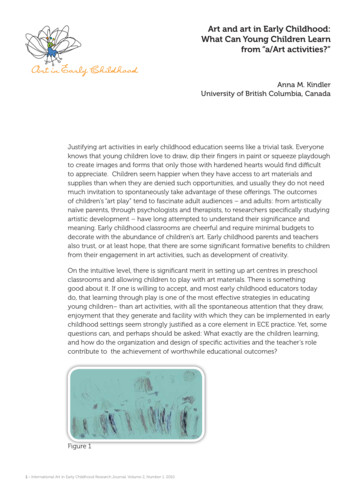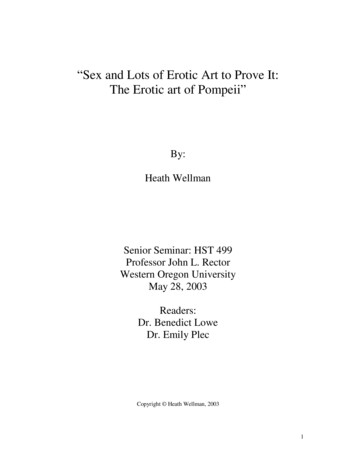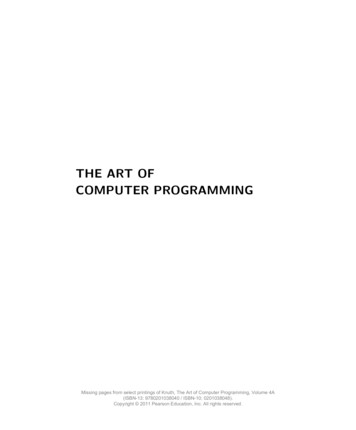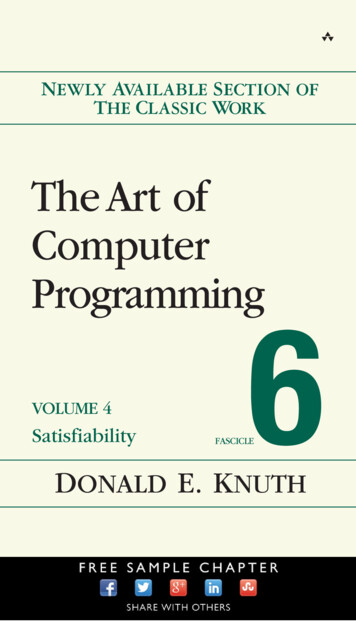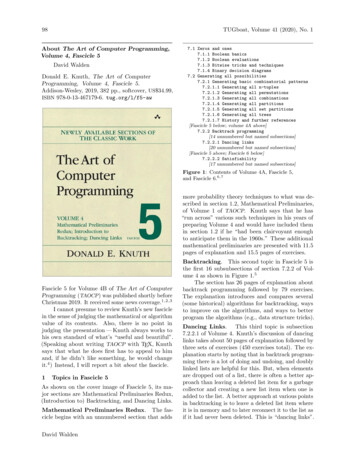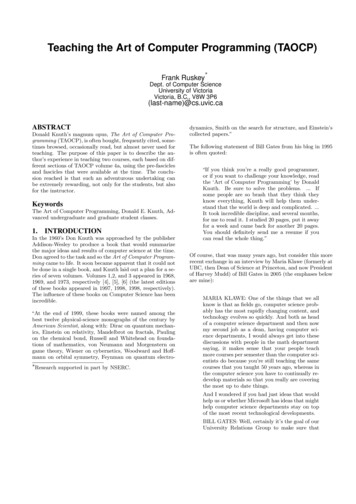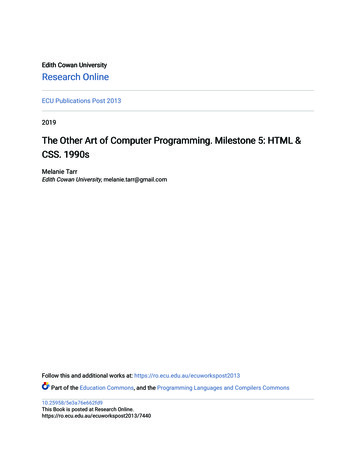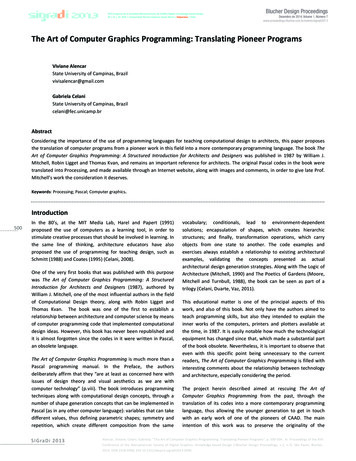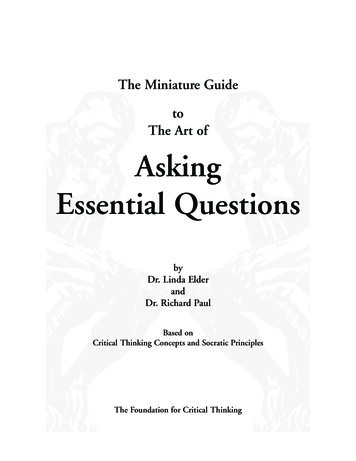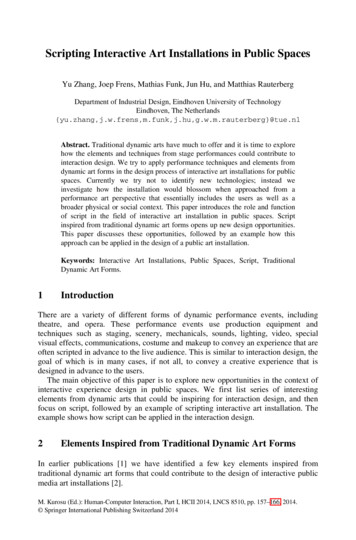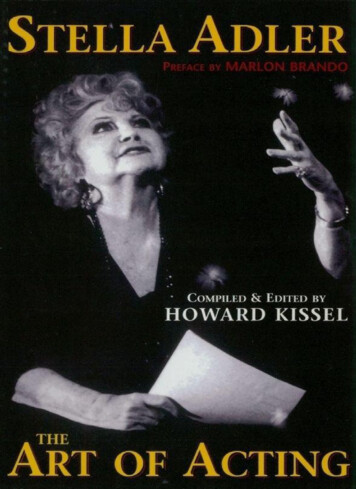
Transcription
An Applause OriginalTHE ART OF ACTING by Stella AdlerCompiled and edited by Howard KisselCopyright 2000 by Applause BooksAfterword copyright 2000 by HowardKisselAll rights reserved. Printed in CanadaJacket and frontispiece photoscourtesy of Irene Gilbert, ArchivalCollection, Stella Adler Academy andTheatre—Los AngelesNo part of this publication may bereproduced or transmitted in any formor by any means, electronic ormechanical, including photocopy,recording, or any information storageor retrieval system now known or to beinvented, without permission in writing
from the publishers, except by areviewer who wishes to quote briefpassages in connection with a reviewwritten for inclusion in a magazine,newspaper, or broadcast.9781617746192Library of Congress Cataloging-inPublication DataLibrary of Congress Card Number: 00108803British Library Cataloging-inPublication DataA catalogue record for this book isavailable from the British Library.
Applause Theatre & Cinema Books19 West 21st Street, Suite 201New York, NY 10010Phone: (212) 575-9265Fax: (212) 575-9270Email: info@applausepub.comInternet: www.applausepub.comApplause books are available throughyour local bookstore, or you may orderat www.applausepub.com or call MusicDispatch at 800-637-2852.Sales & Distribution:North America:
Hal Leonard Corp.7777 West BluemoundRoadP.O. Box 13819Milwaukee, WI 53213Phone: (414) 774-3630Fax: (414) alleonard.com
Table of eenEighteenNineteenTwentyTwenty-One
Class Twenty-Two
PREFACETo me Stella Adler is much more thana teacher of acting. Through her workshe imparts the most valuable kind ofinformation — how to discover thenature of our own emotionalmechanics and therefore those ofothers. She never lent herself to vulgarexploitations, as some other wellknown so-called “methods” of actinghave done. As a result, hercontributions to the theatrical culturehave remained largely unknown,unrecognized, and unappreciated.As far as I know, she was the onlyAmerican artist who went to Paris tostudy with Konstantin Stanislavski, whowas himself a skilled observer ofhuman behavior and a most prominentfigure in Russian theatre. She broughtback to this country a knowledge of his
technique and incorporated it in herteaching. Little did she know that herteachings would impact theatricalculture worldwide. Almost all filmmaking anywhere in the world hasbeen affected by American films,which has been, in turn, influenced byStella Adler’s teachings. She is lovedby many and we owe her much.I am grateful to the inestimablecontributions she has made to my lifeand I feel privileged to have beenassociated with her and her familyprofessionally and personallythroughout my life.— MARLON BRANDO
CLASS ONEFIRST STEPS ON STAGEOver the next few months you will hearme say repeatedly that acting is notabout you. But right at the start I wantyou to know that you do matter.You live in a very busy world. Youdidn’t have your coffee, or yougrabbed it at the cafeteria. Your babyis home crying, or your husbanddoesn’t love you, or your boyfrienddidn’t call you. Everybody has troubles.Then there’s the scattered personwho doesn’t know where she is. She’slate for no reason. She’s just late.That’s her way of life.You must understand that whileyou’re in this room you leave theoutside world outside. You need all of
yourself here. You don’t need yourfather. You don’t need your mother.You don’t need your husband. Youdon’t need your child. You don’t carewhat happens in The New York Times.You need 100 percent honorableselfishness toward you.You are about to embrace aprofession that is 2,000 years old.However, what being an actor hasmeant for most of that time is not whatit means now.Actors today face certainrequirements, certain realities thatwould have been unheard of, evenimpossible fifty years ago. Peoplewould have been astonished at anactress being required to audition forJuliet, for instance. When I was a
young actress you didn’t audition. Youwere a member of a company, andthey’d seen you. They had practicallyraised you.They wouldn’t dream of producingRomeo and Juliet, unless they weresure they had, right in their company,a capable Romeo, a capable Juliet, agood Nurse, a good Friar Laurence.They had seen you develop as anactor over a period of time. They knewwhat you could do. And what youcouldn’t.You joined the company, and youtraveled through the provinces. Youplayed little parts. That’s how youlearned to act. They showed you howto hold a spear. They saw you weren’tholding it right and they showed youhow to hold it. That’s how you learnedto hold a spear and, eventually, how toplay Hamlet.
You’re not so lucky. You only thinkyou are, because you’ve been feddreams of actors being “discovered” atdrug store counters. But even if thatdream did come true, if you shot rightto the top, you’d be the poorer actorfor never learning how to hold thatspear. And you’d never know whyeither.Carrying a spear makes you adifferent person. You have to see whatit means to carry a spear at that time.Today there’s no reason to carry aspear. Or no longer the same reason.In other times there were extremelyimportant reasons for it, and for doingit right. Was it for a great ceremony?Was it for warfare? You mustunderstand those reasons. This is theessence of our job as actors.Today you can start not holding thespear but on top. Today we have
instant actors. You can start by beingthe lead. You can start anywhere theywant you to start. This is an absolutelynew phenomenon.Nobody took you out of a drugstoreand said, “Play D’Artagnan.” You werein a company. You played a youngman. Maybe you played an old man.You played a little comedy, a littledrama. Nobody who played Falstaffcould also play Romeo. By being insuch a company everyone found hisscale.Today’s actors don’t have thispriceless resource. You and your scaleare an unknown quantity. The only wayyou can learn your scale, that you canlearn your job quickly — because thatis what acting demands of you today— is through a studio, a school.Now there is a certain snobbism
today that says you don’t learn actingby . acting. They think you have tolearn acting in a classroom. Well, Ilearned acting by acting. But that’sover. There are people who travelledthe country by covered wagon. That’sover too. The classroom is not ideal,but it’s all you have. And so here youare.You’re here to learn a tradition thatgoes back two millenia. The theatrehas roots that go back to AncientGreece. The stream of dramaticliterature runs from the Roman to theElizabethan, to the Jacobean, to theRestoration, to the FrenchRenaissance, to the Romantic Period,to Ibsenian Realism and Naturalismand leading to the gulf of the 20thCentury. The tradition embraces all theregional and national characteristics,all the languages, all the shifting,changing styles, the different periods
of time, the different levels of society,the mores and morals of passing years. the cut of clothing from generationto generation . the differentfurnitures, the very sound of the musicin the air, the evolution that haschanged the earthenware mug into apaper drinking cup.This is the inheritance of the actor,the theatre student of today.It’s an awful lot of words to use tothe actor, but somehow he must bemade aware. The young actor todaytends to be little. He seeks to protecthis little emotion as he sits comfortablyin his little chair in his little blue jeansand stares at his little world thatextends from right to left.He has confined himself to the beatof his generation only, boundedhimself within the limits of his street
corner and alienated himself fromevery object or period that doesn’tcontain his pulse.The result of this is a disrespect forthe world in general and a foreignnessto anything around him that isn’timmediately recognizable to hiseveryday habits. He has even begunto lose perspective on what his ownassets and faults are, because he hasnothing to measure these thingsagainst.It is time to take the blindfold off.You come from different parts ofsociety, from different neighborhoods.The thing that leads you here, at thismoment, is that you have talent. Takemy word for it. The thing that makesyou say, “I want to do something” —
that is the beginning of talent.What is important and what youmust always remember is that you hadthe courage to find the way, thegrown-up sense to call up, to fill out anapplication, to find your way down hereto me. Now say, “I have one credit onmy side.” Don’t give that up foranybody. It is something you havedone.In your society, where they teardown old buildings and put up newones, many of you are going to aim atmaking money. Even if you startedbecoming a priest, somehow you’regoing to try to cash in on it. I’ve neverasked a priest about this, but somedayI will. These different aims are in you.It’s what your mother thinks, yourfather thinks. Everybody tells you thatyou have to be successful. Successmeans for some of you TV, movies,
working all the time. It means beingapplauded. It means being reassured.I’ll let you in on a big secret. Noactor is a success unless he feelsinside himself, as long as he lives, thathe is good. If you don’t feel that you’regood, no money can give it to you! Noapplause can give it to you! No symbolof success can give it to you! Thatfeeling, of an artist or an actress, thatconfidence must come from him inspite of everything. And this is theconfidence we must establish in you.And when you have it, you will notneed me. You will not need anybodyYou will collaborate with the director,but you will never say, “Help me!”An actress must be secure. Youmust travel 10,000 miles to find theperson who gives you a technique that
makes you secure. You have to keepgrowing in order to feel secure. Youmust not have an aim that is low. Youcannot have an aim that is low andkeep your security. Security when youget it gives you growth. The doctorwho doesn’t grow in his science is ahack. The actor that doesn’t grow is ahack.Write this down: “My aim is to beindependent from Miss Adler oranybody else. I know this as well asyou do, and in the sense that I know itas well as you do, I don’t need you.”And I will help you to achieve thisindependence.I have had people walk up to meand ask, “Do you teach The Method?”or “Are you ‘Method’?”
Now Mr. Stanislavsky himself — andI’ll tell you this with great pride, as I’mthe only person I know who actuallyworked with him — Mr. Stanislavskyhimself was a very conservativeteacher.If you read his book you will see this.But don’t read his book, because itabsolutely makes no sense. He camefrom a culture entirely alien to yours,and you won’t understand it. Hespends the whole time talking in hissecond book and his third book aboutthe beauty of a vowel and what “s”means and how “s” can mean fivemillion things. You’ll only get confused.He was very busy with things that havenothing to do with the so-calledinterpretation of The Method.Mr. Stanislavsky had his Method. Doyou understand? It was a method thatincluded the French style of acting,
which was based on Commediadell’Arte. It was a method that includedthe Italian school of operatic acting.For Stanislavsky the greatest actorwas Salvini, and Salvini said, “What isacting? Voice. Voice. And Voice.” Thisis what Mr. Stanislavsky also included.The Method is something you’ll findthrough me. I am one of the twomillion people who have been inspiredby it. But my particular contribution willbe to make you independent of TheMethod. You will then have thestrength to reformulate it and go yourown way.Nowadays it’s very fashionable to bea Method actor. Therefore it’s time tochange. When it’s really fashionable,there’s something wrong.An actor once came up to me andsaid, “I’m a Meth.” and he mumbled
something. I said, “Get out of here. Idon’t want that around. It’s toocorrupt.”You won’t have the chance to learnthis ten times in your life. You’re luckybecause I come from the same societythat you come from. The society didnot swallow me. It didn’t eat me up. Ittried to, but I came out and in someway you will too.I know you must make a living, and Iknow you must be a success. I knowthat in our society we can’t pretendsuccess doesn’t matter. But beyondthat you must understand that soonyou’ll have in front of you a picture ofyour whole self, a diagnosticphotograph.
And this photograph will say, “This iswhat I am capable of, and this is whatI must work on. The success and themoney will then be in proportion towhat you can become. You mustconsider at each juncture, ”Am I willingto trade this much work and progressfor this much success and money?(And at times the money and successwill be zero.)Today the influences of your societypressure you to be successful beforeyour time. They are pulling you down.They have pulled you down, you big,sweet, magnificent, young, potentialartists. They have pulled you down sofar that you are on the verge ofdestruction. Only you don’t know itbecause you want to be a success.I want you to be able to say, “Theycan give me the part or they can takeaway the part. I know I’m an actress. I
know how to live with my work,whether or not they give me the part. Iknow without them giving me thechance.How do I do that? How would I dothat? Because I would never havethought of going into a commercialplay if I could play in a good theatre. Iknew the great people — Mr.Stanislavsky, Mr. Guthrie, Mr.Reinhardt. They don’t aim as low asmost managers. I needed theirrespect. If you say, “I want to go onTV,” then if they take TV away fromyou what will you do? How will yousurvive? If they take TV away from Mr.Guthrie, he is still Mr. Guthrie.Reinhardt, too.I would say, for every doll
Applause books are available through your local bookstore, or you may order at www.applausepub.com or call Music Dispatch at 800-637-2852. Sales & Distribution: North America: Hal Leonard Corp. 7777 West Bluemound Road P.O. Box 13819 Milwaukee, WI 53213 Phone: (414) 774-3630 Fax: (414) 774-3259 Email: halinfo@halleonard.com Internet: www.halleonard.com. Table of Contents Class One
